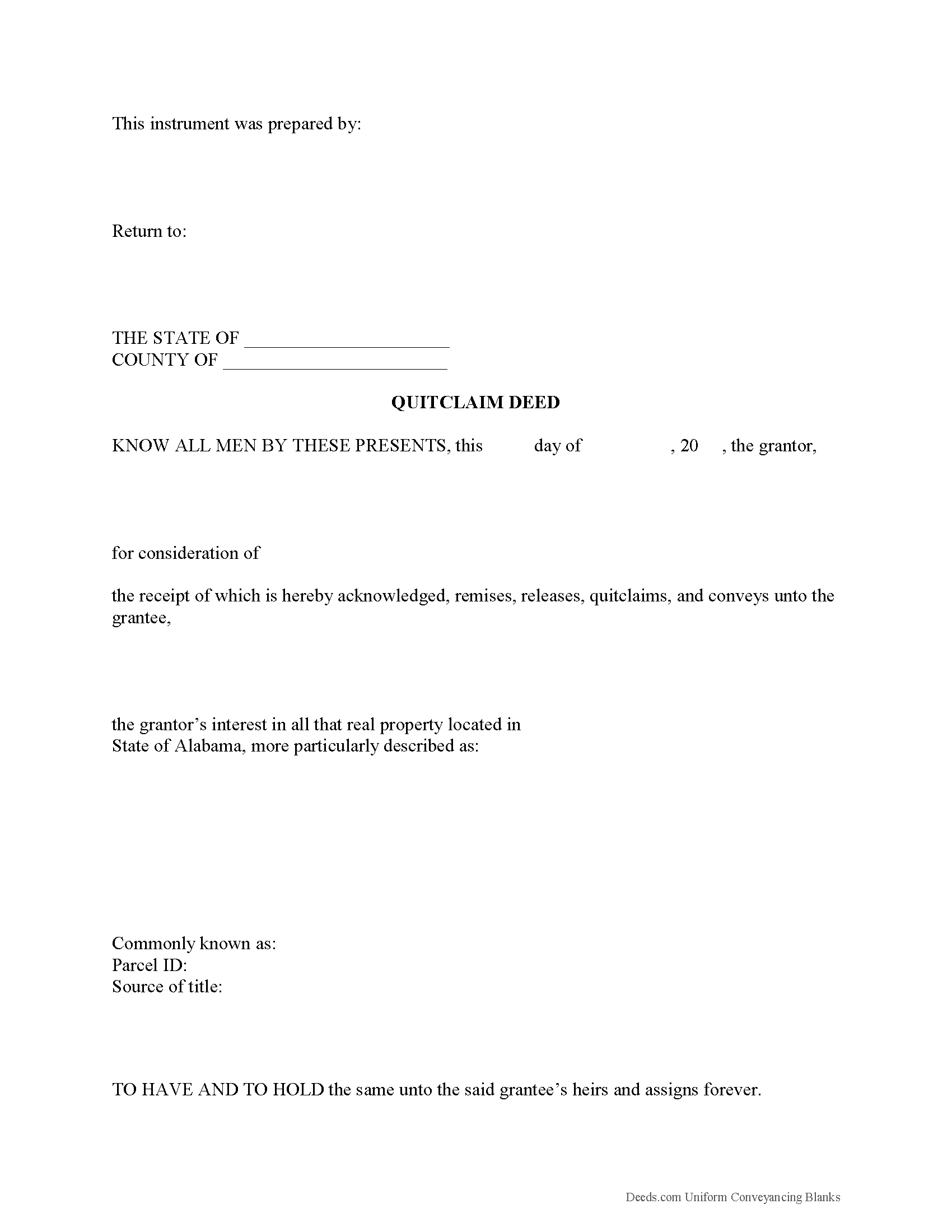Alabama Quitclaim Deed Forms

Alabama Quitclaim Deed Overview

How to Use This Form
- Select your county from the list on the left
- Download the county-specific form
- Fill in the required information
- Have the document notarized if required
- Record with your county recorder's office
Form of the Alabama Quitclaim Deed:
According to Ala. Code 35-4-20, a quitclaim deed must be on a tangible medium, such as paper or parchment. While traditionally handwritten, modern practice includes typed or computer-generated documents, provided they are physically printed.
Signatory Requirements:
The deed must be signed or marked by the grantor or an authorized agent, as required by Ala. Code 35-4-20.
Grantor Information:
Essential details like the grantor's name, address, and marital status must be clearly stated (Ala. Code 35-4-20).
Marriage Considerations:
For properties owned individually by one spouse, only that spouse's signature is necessary. However, if the property is a designated homestead, both spouses must sign, as mandated by Ala. Code 35-4-20.
Homestead and Non-Homestead Provisions:
Transfers of non-homestead properties need a statement clarifying that the property is not the grantor's homestead.
Detailed Property Description:
A full legal description of the property, including references to prior recordings, is required as per Ala. Code 35-4-20.
Grantee Details:
The deed should include the grantee’s name, address, and vesting information.
Deed Preparer Information:
The individual preparing the deed must be identified, including their name and address, as required under Ala. Code 35-4-110 and 35-4-113.
Witness and Acknowledgment:
Notarization or a witness statement is required. If the grantor cannot write, an additional witness is necessary (Ala. Code 35-4-20).
Avoid Implied Warranties:
Due to the nature of quitclaim deeds, words implying warranties like "grant," "bargain," or "sell" should be avoided. Instead, use phrases like "quit claim and convey" or "remise, release, and quit claim" to indicate the transfer of interest without any warranties (Ala. Code 35-4-271).
Recording Requirements:
Mandatory Recording with Probate Judge:
The deed must be recorded with the probate judge in the county where the property is located to ensure legal recognition of the ownership transfer (Ala. Code 35-4-50).
Benefits of Recording:
Recording the deed provides public notice of the change in ownership, protects the rights of the current owner, and maintains an unambiguous chain of title.
Priority in Disputes:
In property ownership disputes, a later owner who has recorded their conveyance generally has legal precedence over an earlier owner with an unrecorded document (Ala. Code 35-4-50).
Consideration Disclosure:
Deed Consideration Clause:
Ala. Code 35-4-34 specifies that the actual consideration (the purchase price or value) does not need to be included in the deed's text.
Real Estate Sales Validation Form Requirement:
Since Ala. Act 2012-494, the actual purchase price or value of the property transfer must be disclosed using the Real Estate Sales Validation Form, in accordance with Ala. Code 40-22-1. The deed cannot be recorded without submitting this form and paying the necessary tax.
County-Specific Stipulations:
Individual counties in Alabama might have specific requirements for quitclaim deeds, including unique formatting, additional information, tax forms, or other documents. Always check with local authorities to ensure full compliance before attempting to record your quitclaim deed.
Important: County-Specific Forms
Our quitclaim deed forms are specifically formatted for each county in Alabama.
After selecting your county, you'll receive forms that meet all local recording requirements, ensuring your documents will be accepted without delays or rejection fees.
How to Use This Form
- Select your county from the list above
- Download the county-specific form
- Fill in the required information
- Have the document notarized if required
- Record with your county recorder's office
Common Uses for Quitclaim Deed
- Transfer property between family members
- Add or remove names from property titles
- Transfer property into or out of trusts
- Correct errors in previously recorded deeds
- Gift property to others